Survey: US firms still optimistic about China
Updated: 2014-09-30 06:04
By CHEN WEIHUA in Washington(China Daily USA)
|
||||||||
The vast majority of US companies operating in China remain optimistic about their business prospects in the world's second-largest economy, according to a survey released Monday by the US-China Business Council (USCBC).
Overall, 85 percent of the companies polled said they are optimistic or somewhat optimistic, while 14 percent said neutral. Only 1 percent said somewhat pessimistic.
Although the percentage of optimistic and somewhat optimistic dropped slightly from last year's report, and the percentage of neutral expanded, the percentage saying somewhat pessimistic also came down. None chose pessimistic this year, compared with 2 percent in the previous survey.
The report, USCBC 2014 China Business Environment Survey Results, was USCBC's annual survey of senior executives at its more than 200 member companies. Half of the respondents are China-based; the other half is based in the US.
Eighty-five percent of participating companies have been in the Chinese mainland market for more than 10 years, with the majority having more than 20 years' experience.
USCBC President John Frisbie said in a statement about the report that the Chinese mainland market continues to deliver important revenue opportunities for American companies, even as GDP growth moderates.
Nearly 50 percent of respondents reported double-digit revenue expansion, less than in prior years, but still impressive compared to other markets around the world, according to the report. And the great majority, or three quarters, of US companies remained profitable in the Chinese mainland market last year.
Meanwhile, 71 percent expect their revenue to continue to increase this year, while 19 percent expect the same as last year. Only 10 percent said their revenue will decline in 2014.
The survey also found that 43 percent said the profit margin rate of their China-based operations is better than their overall operations. Twenty-seven percent said the same; 31 percent said worse.
The major reasons cited for the restraint on increased profitability include competition from domestic companies, rising costs and government policy and regulation, according to the survey.
On the question of who are the main competitors in China, 91 percent said US and other foreign companies, 79 percent said Chinese non-state-owned and private companies, and 61 percent said Chinese state-owned enterprises.
Most economists agree that after decades of development, Chinese companies, especially private firms, have become increasingly competitive in the business world.
Nicholas Lardy, a senior fellow at the Washington-based Peterson Institute for International Economics, wrote in detail about the rise of private sector in China in his latest book Markets over Mao: The Rise of Private Business in China.
Many observers have also attributed the growing competition from the Chinese companies to as of 2011 foreign-funded companies no longer enjoy tax preferences in China as in the previous more than three decades, thereby putting them on a level playing field with Chinese domestic companies in terms of tax regime.
While responding to the question of China's prominence in the overall company strategy, the survey found 93 percent said it is the top priority or among the top five priorities, slightly down from the previous year. Yet the percentage putting China on top priority increased to 22 percent from 15 percent last year.
On committing resources for the next 12 months, half the respondents said it will accelerate, and 48 percent said it will remain unchanged. Only 2 percent said they will curtail the committed resources.
While the Chinese mainland market provides huge opportunities for US companies, the survey found that the top 10 challenges cited by USCBC-member companies were competition with Chinese companies in China, intellectual property rights enforcement, foreign investment restrictions, human resources pertaining to talent recruitment and retention, cost increases, uneven enforcement/implementation of Chinese laws, licensing, transparency, nondiscrimination/national treatment and overcapacity in the Chinese mainland market.
Frisbie of USCBC said while both foreign and domestic companies are being investigated under China's relatively new anti-trust and competition regime, foreign companies appear to be facing increasing scrutiny.
Lardy, a leading US expert on the Chinese economy, described several German automakers in China as violating the US laws if they adopted their same China practices in the US, referring to the monopoly of selling their auto parts at much more inflated prices in China.
Zhang Monan, a researcher of China International Economic Exchanges Center, agreed. She argued in an article on the China US Focus website that the enforcement of anti-trust law is good for the healthy development of a market economy.
She cited the example of a Range Rover 5.0T being priced at 2.798 million yuan ($454,950.00) when exported to China and soaring to 3.2 million yuan in the end market. However, the sedan is sold for only 1.052 million yuan in Japan, 1.036 million yuan in Germany, 835,000 in Britain, its home country, and 833,000 yuan in the US.
China has said less than 10 percent of companies being investigated under the anti-monopoly law are foreign companies.
Zhang described the ongoing anti-monopoly campaign as an important step China has taken to establish a law-ruled market economic system as well as participate in global economic rebuilding.
"Once fair competition has become common in society, it will greatly benefit not only China but also the rest of the world," she said.
chenweihua@chinadailyusa.com
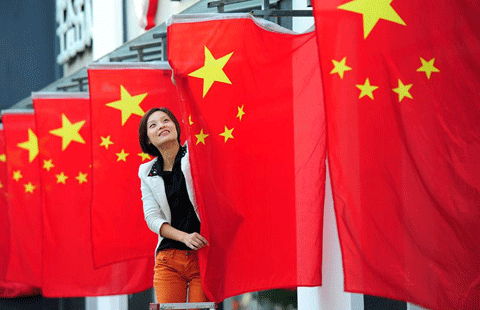
 National Day celebrated across China
National Day celebrated across China
 iPhone 6, 6+ will be sold in mainland
iPhone 6, 6+ will be sold in mainland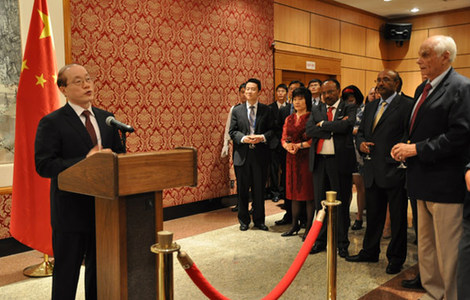
 Happy 65th birthday!
Happy 65th birthday!
 100,000 Strong is heralded
100,000 Strong is heralded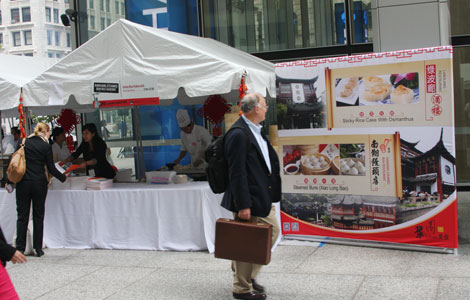
 Dine Around Downtown returns for 13th year
Dine Around Downtown returns for 13th year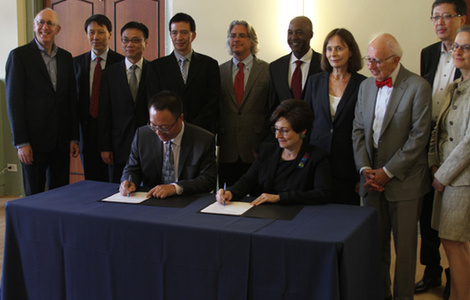
 Perfect World signs MoU with Columbia University
Perfect World signs MoU with Columbia University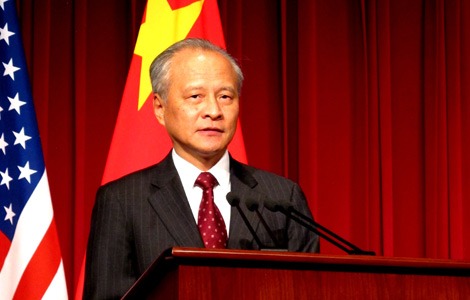
 China, US bid to work together
China, US bid to work together
 Xinjiang's first high-speed railway to start operation
Xinjiang's first high-speed railway to start operation
Most Viewed
Editor's Picks

|

|

|

|

|

|
Today's Top News
100,000 Strong is heralded
'Great cause' martyrs honored
First Ebola case reported in US: CDC
Columbia University, Chinese gamer join study
100 foreigners get Friendship Award
US firms remain optimistic about China
China marks first Martyrs' Day
Chinese, Indian troops withdraw from border standoff
US Weekly

|

|








